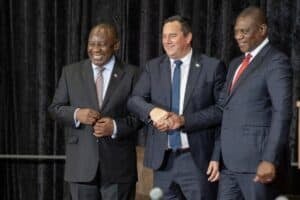Government of national unity navigates policy clashes; compromise essential for functional multiparty governance, say political analysts.

Each of the parties to the government of national unity (GNU) will push for its policies to prevail in the multiparty government, but they will have to compromise if the new set-up is to function, say experts.
Independent political analyst Khanyi Magubane said it all boiled down to political maturity by all sides; political economy analyst Daniel Silke said the ANC and the Democratic Alliance (DA) would try to find common ground in the interest of the GNU, but differences would creep in and cause tension between the two sides despite their cooperation.
ALSO READ: PAC joins unity government to ensure ‘superior logic and vision’ will guide SA
Magubane was of the view that the most important immediate milestones were the inauguration of the president and the appointment of the Cabinet.
Compromises on policies
“The DA will definitely push for some of its policies to make it into the way government is run, especially in areas of finance, where tighter fiscal policy instruments need to be in place to reduce irregular spending,” she said.
“The DA also has policies around trimming down the Cabinet to 15 departments to focus on key areas, so I think this is where the conversations are. The DA will certainly seek to make changes where it can.”
The ANC, on the other hand, would want to maintain its policies on social welfare and black economic empowerment, among others, plus its position on the Palestinian-Israeli issue as well.
“So, in my opinion, it boils down to political maturity. Both sides have to compromise and also hold their positions at the same time,” Magubane said.
Silke believed there were common issues among the GNU partners, especially the DA and ANC. There is synergy in areas such as state efficiency, getting the right people into the public service and the private-public partnership. But some of their differences could spoil the relationship.
“Issues like the NHI [National Health Insurance] is something the DA won’t just let pass, although lately it has not been vocal on cadre deployment, economic empowerment – obviously they have held back on these matters.
ALSO READ: Is there a secret deal between the ANC and DA to protect Ramaphosa?
“It looks like the DA held back on some of the major ideological differences with the ANC in the interest of finding common ground.
“But, over time, those issues will begin to creep in and I think that’s going to be an issue.” Silke asked whether the ANC could adapt to being a minority player after 30 years of being a powerful party, answerable to nobody, and which now had to answer to the coalition agreement partners in a very real way.
“The ANC is no longer the only game in town. Its own internal public representatives, its NEC and the broader ANC caucus have got to come to terms with that.
“To what degree will the ANC tolerate the diffusion of its political power to the DA, IFP [Inkatha Freedom Party] and other smaller parties? That is a big challenge.”
The DA would try hard to exert its influence, but he asked whether it could make a difference; will the DA voice be heard; will it influence policies on issues where there are differences with the ANC; and to what degree will some of the liberal ideological philosophies, like the free-market policies, conflict with the more developmental state policy from the ANC?






